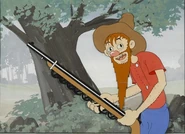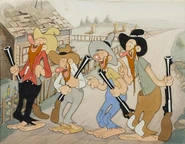TheBigGnome (talk | contribs) (credit on artist's page) |
TheBigGnome (talk | contribs) (The film closing is not part of the plot.) |
||
| (3 intermediate revisions by 2 users not shown) | |||
| Line 33: | Line 33: | ||
Warner-bros.-studios-a-celluloid-from-a-feud-there-was.jpg|Production Cell |
Warner-bros.-studios-a-celluloid-from-a-feud-there-was.jpg|Production Cell |
||
Warner-bros.-studios-a-celluloid-of-the-weavers-and-the-mccoys-from-a-feud-there-was.jpg|Second Production Cell |
Warner-bros.-studios-a-celluloid-of-the-weavers-and-the-mccoys-from-a-feud-there-was.jpg|Second Production Cell |
||
| + | 1ca32b20896f477de7722492c8836b51.png |
||
</gallery> |
</gallery> |
||
==Availability== |
==Availability== |
||
| Line 63: | Line 64: | ||
[[Category:Cartoons with sound effects edited by Treg Brown]] |
[[Category:Cartoons with sound effects edited by Treg Brown]] |
||
[[Category:Cartoons with characters voiced by Mel Blanc]] |
[[Category:Cartoons with characters voiced by Mel Blanc]] |
||
| − | [[Category:Cartoons with characters voiced by Sara Berner]] |
||
[[Category:Cartoons produced by Leon Schlesinger]] |
[[Category:Cartoons produced by Leon Schlesinger]] |
||
[[Category:Cartoons in a.a.p. package]] |
[[Category:Cartoons in a.a.p. package]] |
||
Revision as of 20:06, 23 July 2019
Template:Infobox Shorts wTabs A Feud There Was is a 1938 Merrie Melodies short directed by Tex Avery.
Plot
Two feuding families of stereotypical hillbillies, the Weavers, and the McCoys, spend their time taking potshots at each other. At one point, a McCoy asks if there are any Weavers in the movie audience. One man, shown as a silhouette against the screen, answers in the affirmative, and the McCoy takes a shot at him.
In the midst of the fray, a yodeling, bulbous-nosed, domestic peace activist enters the feud zone on a motorscooter bearing the words "Elmer Fudd, Peace Maker", and goes to each side preaching peace and an end to wanton bloodshed. Neither side is impressed, and when "Elmer" attempts once more to preach peace to both families, both sides get furious at him and open fire on the would-be peacemaker together. When the smoke clears, only "Elmer" is left standing. He gives a final yodel and says "Good night, all!" and the Weaver in the movie audience yells "Good night!" taking one more shot at the star.
Gallery
Availability
- (1986) VHS - Viddy-Oh! For Kids Cartoon Festivals: The Best of Bugs Bunny and Friends
- (1992) LaserDisc - The Golden Age of Looney Tunes, Vol. 3, Side 8: The Evolution of Egghead
Notes
- First cartoon to be reissued in the Blue Ribbon series.
- This is the first cartoon with the name Elmer Fudd, although "The Isle of Pingo Pongo" featured "Elmer" on its lobby card.
- This was a minimal first step in the evolution from one to the other. Egghead's speaking voice was provided on this occasion by Arthur Q. Bryan, although it did not resemble the more familiar "cwazy wabbit" voice which would later be performed for Fudd by Bryan. The character's singing voice was provided by Roy Rogers and additional vocals in the cartoon were done by the Sons of the Pioneers.
- EU dubbed uses 1938 ending card instead of 1948 card. Also happens on EU versions of "Hobo Gadget Band", "Fox Pop", and "I Only Have Eyes for You". Also, the EU dubbed version uses the 1938-41 end cue while the US uses the 1941-55 end cue.




